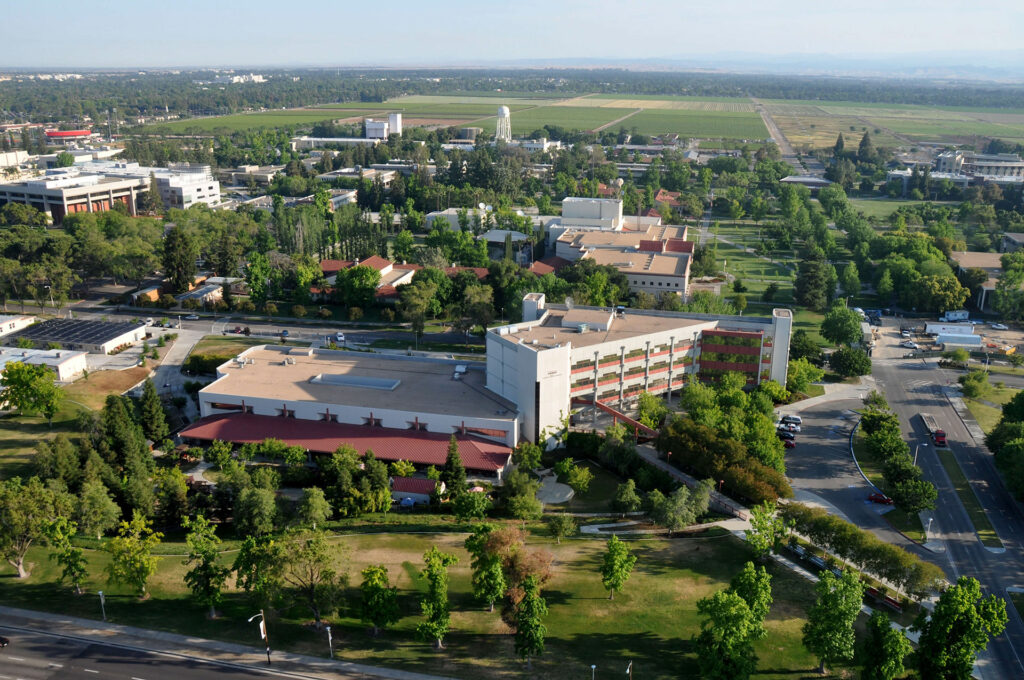
Fresno State University
Credit: fresnostate.edu
Students and faculty at all three of California’s public higher education institutions do not trust how colleges and universities handle sexual discrimination and harassment.
The lack of trust was detailed in a California Assembly Higher Education Committee report released last week that offers recommendations on how the state’s public colleges and universities can better address sexual harassment and discrimination.
The report addressed significant deficiencies in the University of California, California State University and California Community College systems’ handling of Title IX, which is the federal education law that prohibits schools from sex-based discrimination. For example, none of the state’s public colleges or universities review how campus leaders plan to address and prevent sex discrimination as part of administrators’ evaluations. Another deficiency: The community college system does not mandate student participation in annual sex discrimination prevention education programs.
The report highlighted that students at faculty across all three systems distrust and resent their institutions when it comes to handling Title IX cases. “The prevailing message from students, staff and faculty is that current policies of the CCC, CSU, and UC do not protect survivors and instead are used to protect the institution from lawsuits,” according to the report.
Wendy Brill-Wynkoop, president of the Faculty Association of the California Community Colleges, said the goal for every district and campus should be moving from being reactive to being proactive and creating a culture of respect.
“When you have someone who has already been traumatized or victimized and you’re asking them to go through this incredibly lengthy and cumbersome process without an advocate, that’s not the greatest way to try and come to a resolution,” said Brill-Wynkoop, adding that an oversight body would be helpful. “Every district tries to do things correctly, but without some sort of system check, it’s difficult.”
Furthermore, the report found that California lacks an effective method for monitoring and regulating Title IX standards in its higher education institutions.
“California’s public higher education institutions are critical to the future of our state, and we must ensure our values of diversity and inclusivity are reflected in providing all students with a safe learning environment and all staff with a working environment free from harassment and discrimination,” Assembly Higher Education Chair Mike Fong said, adding that he will work with lawmakers to introduce legislation based on the report’s recommendations.
The report recommended providing more funding to the colleges to address sex discrimination, creating a statewide office to provide guidance and monitoring, annual compliance reports to the Legislature, and creating systemwide independent civil rights offices for each of the three systems. The committee also recommended more training and education, and making campus leaders more responsible for addressing sexual harassment and discrimination.
A spokesperson from the community colleges chancellor’s office said: “The Chancellor’s Office agrees with the findings and conclusions of this important report and looks forward to working with the committee, the Legislature and our colleges to implement the recommendations. We are fully aligned with the commitment to improve California’s higher education systems to better address discrimination and provide safe, inclusive environments for all students, faculty and staff.”
The Assembly Higher Education Committee conducted the report following a series of news nationally and statewide about mishandled Title IX cases. The committee report cites EdSource’s investigation into Chico State, where a professor was investigated for an inappropriate sexual affair with a graduate student. He was put on paid leave last year after EdSource disclosed that he had allegedly threatened to shoot colleagues who cooperated in the investigation.
The report also noted other EdSource coverage of Title IX cases at CSU campuses and an investigation by USA Today into the mishandling of a Title IX case by then President Joseph I. Castro. The case led to his resignation as CSU chancellor.
The Cal State system was found to have mishandled a variety of cases over the year and reports from an independent law firm and the California State Auditor’s office last year found the 23 -campus system lacked resources and failed to carry out its Title IX responsibilities.
In response to the Assembly committee’s report, a spokesperson from the Cal State chancellor’s office said: “Any form of discrimination, harassment and misconduct is unacceptable. The CSU stands ready to work with legislators and with leaders from across the CSU system — including university administrators, staff, faculty and students — to make the changes needed to improve our Title IX and other nondiscrimination policies and procedures.”
The report noted that the university system has already changed its policy allowing administrators who have committed misconduct to “retreat” to faculty positions.
CSU is currently implementing the changes and reforms called for in the 2023 state audit and in a report conducted by an independent law firm.
A UC spokesperson said that system has made changes “to address these issues when they arise.” Officials were interviewed for the Assembly report, and UC pledged to “review the recommendations closely in order to uphold our commitment to fostering an environment free from sex-based discrimination for all members of the UC community.”


